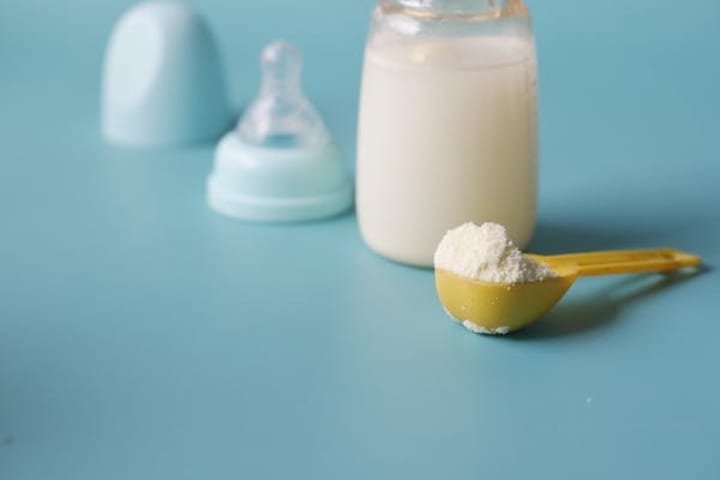
When it comes to feeding a newborn baby, it's important to follow their cues and feed them on demand. Here are some guidelines for what and how much to feed a newborn:
- Breast Milk: Breast milk is the best food for newborn babies. It provides all the nutrients they need and helps protect them against infections and illnesses. Newborns should be fed on demand, usually 8-12 times per day, or whenever they show signs of hunger, such as rooting or sucking on their fists.
- Formula: If a mother is unable to breastfeed, or chooses not to, formula can be used as a substitute. Newborns should be fed formula on demand, usually 8-12 times per day, or whenever they show signs of hunger.
- Amount of Milk: Newborns typically consume 1-3 ounces of breast milk or formula per feeding in the first few weeks of life. However, some newborns may need more or less than this amount. It's important to let the baby decide how much they want to eat and not force them to finish a bottle or breast.
- Introducing Solid Foods: Solid foods should not be introduced until the baby is around 6 months old. Before that, breast milk or formula should be the sole source of nutrition. When it's time to introduce solids, it's important to start with simple pureed foods, such as mashed bananas or avocados, and introduce one new food at a time to check for any potential allergies.
- Avoiding Honey: Honey should not be given to babies under 1 year old, as it can contain botulism spores that can cause serious illness in infants.
- Staying Hydrated: Newborns do not need water or other fluids in addition to breast milk or formula, as they get all the hydration they need from these sources.
Breastfeeding mothers often face the challenge of producing enough milk to meet their baby's needs. Fortunately, there are certain foods that can help increase milk supply. Here are some of the best foods to eat while breastfeeding:
- Oatmeal: Oatmeal is a great source of iron, fiber, and complex carbohydrates, which can help boost milk production.
- Fenugreek: Fenugreek is an herb that has been shown to increase milk supply in breastfeeding mothers. It can be taken as a supplement or added to food.
- Fennel: Fennel is another herb that can help increase milk supply. It can be eaten raw or cooked and is often used in teas or supplements.
- Leafy Greens: Leafy greens like spinach, kale, and collard greens are high in calcium and iron, which are important for milk production.
- Nuts and Seeds: Nuts and seeds are a good source of protein, healthy fats, and essential vitamins and minerals. Almonds, cashews, and sunflower seeds are particularly good choices.
- Salmon: Salmon is a great source of omega-3 fatty acids, which can help increase milk supply and improve the quality of breast milk.
- Carrots: Carrots are high in beta-carotene, which is important for breast milk production. They can be eaten raw, cooked, or juiced.
- Water: Staying hydrated is crucial for milk production. Aim to drink at least eight glasses of water a day, and more if you are exercising or in a hot climate.
Formula milk is a type of milk-based product that is designed to provide infants with the nutrients they need to grow and develop. Here are some important things to know about formula milk for newborn babies: Types of Formula: There are different types of formula available, including cow's milk-based, soy-based, and hydrolyzed formulas. Cow's milk-based formulas are the most commonly used and are designed to mimic the nutrients found in breast milk.

- Preparing Formula: Formula should be prepared according to the instructions on the package. It's important to use the correct amount of water and formula powder to ensure that the baby gets the right balance of nutrients. The water should be boiled and cooled to the recommended temperature before mixing with the formula powder.
- Feeding Schedule: Newborns typically need to be fed on demand, usually every 2-3 hours, or whenever they show signs of hunger. It's important to let the baby decide how much they want to eat and not force them to finish a bottle.
- Amount of Formula: The amount of formula a newborn needs can vary, but typically they will consume 1-3 ounces per feeding in the first few weeks of life. As the baby grows, they may need more formula at each feeding.
- Storing Formula: Any leftover formula should be discarded after a feeding and not saved for later use. Prepared formula can be stored in the refrigerator for up to 24 hours, but should be discarded after that time.
- Switching Formulas: If a baby is having trouble digesting a particular formula, a doctor may recommend switching to a different type. It's important to consult with a pediatrician or other healthcare provider before making any changes to a baby's diet.
Introducing solid foods to a baby can be an exciting milestone, but it's important to do it in a safe and gradual way. Here are some tips for introducing solid foods to your baby:

- Wait until around 6 months: The American Academy of Pediatrics recommends waiting until a baby is around 6 months old to start introducing solid foods. Before that, breast milk or formula should be the sole source of nutrition.
- Start with single-ingredient purees: When it's time to introduce solids, start with simple pureed foods, such as mashed bananas or avocados. It's best to introduce one new food at a time and wait a few days before introducing another food to check for any potential allergies.
- Use a soft spoon: When feeding your baby, use a soft spoon and offer small amounts of food at a time. Let the baby decide how much they want to eat and do not force them to finish a serving.
- Gradually increase texture and variety: As your baby gets used to eating solid foods, gradually increase the texture and variety of the foods you offer. You can start introducing mashed or finely chopped foods and eventually move on to finger foods.
- Avoid choking hazards: Avoid giving babies foods that can be a choking hazard, such as nuts, popcorn, or hard candy. Cut fruits and vegetables into small pieces and always supervise your baby while they are eating.
- Keep breastfeeding or formula feeding: Solid foods should not replace breast milk or formula as the main source of nutrition in the first year of life. Continue to breastfeed or formula feed your baby while introducing solid foods.
- Be patient: It may take some time for your baby to get used to eating solid foods. Be patient and continue offering a variety of healthy foods.
About the Creator
Karthik Raj
I am a cool guy






Comments
There are no comments for this story
Be the first to respond and start the conversation.